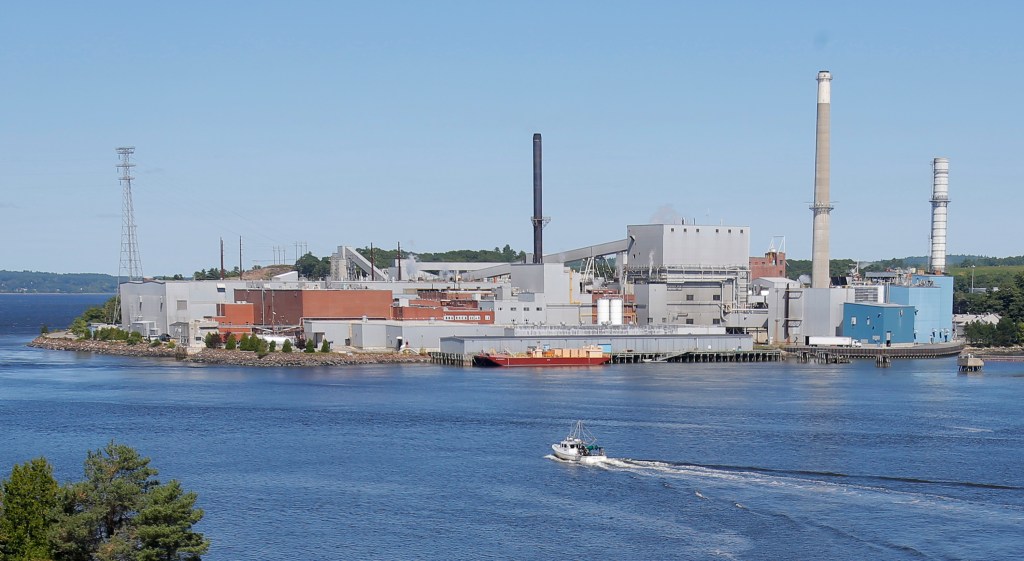When Verso Paper officials announced plans last January to idle the Bucksport mill for two weeks, they blamed two factors: low product demand and soaring natural gas prices.
Nine months later, as the Bucksport community absorbs news that 500-plus local papermakers will soon be unemployed, advocates for adding natural gas infrastructure to supply Maine are citing the mill’s pending closure as a potential sign of things to come unless the “pipeline bottleneck” is addressed.
“If a person is shot six times, it is kind of hard to pinpoint what bullet killed him, but without question, the largest bullet in the heart of the mill in Bucksport is energy costs,” said Tony Buxton, an attorney who represents paper mills and other Maine manufacturers in the Industrial Energy Consumer Group.
Following those early winter shutdowns at Verso and other New England mills, Buxton said he and others predicted that electricity price spikes tied to shortages of natural gas used to generate electricity would prompt corporations “to make decisions about shutting down mills.”
“And here we are,” Buxton said.
In a twist, Verso could benefit from the high cost of electricity.
It plans to keep running the adjacent power plant that generates electricity for the paper mill and is likely to sell the energy back to the grid. A LePage administration official criticized that aspect of the closure Thursday.
“Unfortunately, you are seeing a company move to produce electricity to take advantage of the pricing and move away from a business that employs 500 people,” said Patrick Woodcock, director of the Governor’s Office of Energy.
The power plant employs about 70 workers.
“We are looking at our opportunities and studying options (for the power plant). We really cannot comment on what those might be,” Verso senior vice president and chief financial officer Robert Mundy said Thursday.
The plant already sells some of the power it generates back to the grid.
HIGH GAS DEMANDS IN WINTER
While Mundy said energy costs were just one factor in the company’s decision to shutter the Bucksport mill, the prospect of a repeat of last winter’s price spikes “certainly didn’t help the situation.” The Bucksport mill remained idle for most of January and February to ride out the worst of the energy costs.
Despite New England’s proximity to massive natural gas fields in Pennsylvania, New Englanders pay the highest natural gas prices in the continental United States and are likely facing a supply crunch and roller coaster prices this winter. That’s because New England’s pipeline system lacks the capacity to meet demand from the region’s gas-fired power plants and gas-heated homes during cold winter months.
The result is higher gas prices – and therefore higher electric rates – even as power plants shift to oil, coal and other sources.
“It’s a big deal, obviously,” Mundy said. “We are not alone in that (respect) on this issue, and it certainly was a piece” in the decision.
Maine is the only New England state in which the industrial sector consistently ranks as the largest energy consumer, accounting for roughly one-third of the state’s energy usage. And the state’s pulp and paper mills are a primary driver of that trend.
Making paper and pulp is energy-intensive as raw wood is washed, debarked, chipped, cooked, pulped, pressed, dried and subjected to a litany of other manufacturing processes depending on the end product.
In 2010, the nation’s pulp and paper industry used more energy – a total of 2.1 quadrillion or 2,100,000,000,000 British thermal units of energy – than all but three other manufacturing industries in the country, according to figures from the U.S. Energy Information Administration.
John Williams, president of the Maine Pulp & Paper Association, said the costs of energy and wood are the top concerns in the industry. The price of wood has been higher in the Northeast than in other areas of the country for some time, despite the region’s ample and relatively steady supply of local timber. Williams was unsure of the reason for the high wood prices.
Williams believes the long-term energy trend is improving because many mills are converting from oil to natural gas. Bucksport continued to struggle financially despite switching to natural gas and woody biomass earlier than most because demand for the mill’s coated paper products has waned, he said.
But last winter’s price spikes in the natural gas prices underscored the volatility of the market.
“We just can’t get enough gas up here,” Williams said.
During this year’s Maine legislative session lawmakers passed a bill that enables the state to invest in pipeline infrastructure projects in other states in order to improve natural gas capacity in Maine. That initiative appears to be bearing fruit, at least at the application stage.
Three companies – Houston-based Spectra Energy Corp., Kinder Morgan Energy Partners and the Portland Natural Gas Transmission System – have filed proposals with the Maine Public Utilities Commission asking the state’s ratepayers to help pay for gas pipeline expansion projects. However, the outcome of those underwriting requests is unclear after PUC staff on Wednesday said ratepayers would see insufficient cost savings to justify the $75 million price tag.
Additionally, the issue of pipeline expansion has become a political flashpoint between LePage and Massachusetts Gov. Deval Patrick. Maine’s Republican governor has criticized Patrick, a Democrat, for withdrawing his support for the Kinder Morgan Energy Partners project through northwestern Massachusetts.
Woodcock, the LePage energy official, said New England lags behind other areas of the country that are investing in infrastructure amid the expansion of domestic natural gas extraction. While Woodcock expressed frustration with the slow pace in New England, he noted that most of the region’s states are on board with expanding pipeline capacity.
Buxton, the attorney and lobbyist who represents paper mills and other industrial energy users, suggested that if gas prices were as low in New England as they are elsewhere, Bucksport might not be facing closure at year’s end.
“The energy price increases we are seeing in New England are unprecedented in our history,” he said. “They are gigantic and they are entirely manmade. It is not because the fuel is not available; it is because we have not had the courage to build the infrastructure to get it to the people.”
AN ENERGY ASSET
The gas-fired and biomass power plant that Verso uses to generate electricity for the mill already sells power to the regional grid. Once the mill is shuttered, more electricity will be sold directly to the grid.
Woodcock sees parallels to what’s happening in Bucksport and previous events in the Millinocket area.
Brookfield Renewable Energy Partners sold the two paper mills in Millinocket and East Millinocket, but held onto hydropower facilities. Those mills are now shuttered despite several attempts by the buyer to restart them.
Woodcock’s criticism of Verso’s plan to hold onto the power plant while shutting down the mill stems from the $7.5 million in renewable energy credits the company received from the state for the biomass portion of the power plant last year. The agreement, which was designed to encourage greater energy-efficiency at the mill, does not require the company to continue making paper to receive the tax benefits, Woodcock said.
He said the deal underscores the importance of making sure that any tax incentives given to corporations produce economic benefits to the community or state.
Send questions/comments to the editors.





